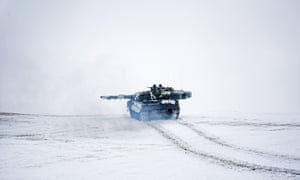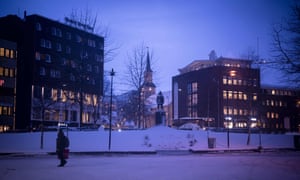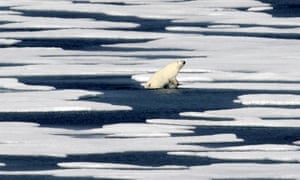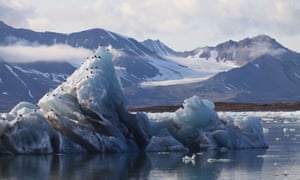As ice melts and shipping lanes open up, geopolitical tensions are growing and old cold war bases are being reopened
The climate crisis is intensifying a new military buildup in the Arctic,
diplomats and analysts said this week, as regional powers attempt to
secure northern borders that were until recently reinforced by a
continental-sized division of ice.
That so-called unpaid sentry is now literally melting away, opening up shipping lanes and geo-security challenges, said delegates at the Arctic Frontiers conference, the polar circle’s biggest talking shop, who debated a series of recent escalations.
Russia is reopening and strengthening cold war bases on the Kola peninsula in the far north-west of the country. Norway is beefing up its military presence in the high Arctic.
Last October, Nato staged Trident Juncture with 40,000 troops, its biggest military exercise in Norway in more than a decade. A month earlier Britain announced
a new “Defence Arctic Strategy” and promised a 10-year deployment of
800 commandos to Norway and four RAF Typhoons to patrol Icelandic skies.
The US is also sending hundreds more marines to the region on long-term rotations and has threatened to send naval vessels through Arctic shipping lanes for the first time.That so-called unpaid sentry is now literally melting away, opening up shipping lanes and geo-security challenges, said delegates at the Arctic Frontiers conference, the polar circle’s biggest talking shop, who debated a series of recent escalations.
Russia is reopening and strengthening cold war bases on the Kola peninsula in the far north-west of the country. Norway is beefing up its military presence in the high Arctic.
While these strategic moves have echoes of the cold war, the modest buildup falls far short of that era, and there remains a strong spirit of cooperation in many areas. The current tensions are a result of a world warmed by industrial emissions. The Arctic is heating up twice as fast as the rest of the planet, shrinking sea ice and exposing more water and territory to exploitation and access.

By 2035, the Arctic is forecast to be free of ice during summer, which will allow ships to sail across the north pole.
Business interest is growing. For the first time, last summer, a Maersk container ship navigated the northern sea route from Asia to Europe carrying fish and electronic goods. Energy companies are exploring new oil and gas fields.
Once remote regions are becoming geopolitical hotspots. Tromsø, in Norway, which hosted the conference, was once a tiny trading post. Today, it’s a tourism hub and a gateway to the mineral-rich north. “Now we have a historically strange situation with political and economic activity in the Arctic. So many people are knocking on our door, including business and state representatives from China, Pakistan, Singapore and Morocco,” the mayor, Kristin Røymo, told the Guardian. “There is also a very obvious increased naval presence.”
This concerns many conference participants, who highlight the peaceful history of cross-border cooperation in the far north. Even during the cold war, there were agreements on fishing, scientific research and reindeer herding that continue today.
Norwegian politicians were at pains to downplay the significance of the current military buildup. “There is no direct link between climate change and conflict,” the former defence minister Espen Barth Eide said. “It’s not because there is an immediate threat, it’s that, as an area becomes more important, it’s natural to have a heightened military presence.”

However, there are tensions. In a keynote speech, the Norwegian foreign minister, Ine Marie Eriksen Søreide, complained about communications interference by Russia in the far north. She plans to arrange a meeting with the Russian deputy foreign minister, Sergei Ryabkov, to discuss the allegation. “Most important is to open political dialogue and talk not just about what we agree on but what we do not agree on,” she said.
Norway is also contributing to the climate problem and the strategic tensions. It has just approved a raft of new oil exploration licenses in the Barents Sea and one of its citizens has been caught spying in Russia.
Russia is uneasy about recent Nato exercises that have pushed deep into the north, according to Teimuraz Ramishvili, the ambassador to Norway. He told the Guardian the military modernisation on the Russian side was overdue after 20 years of neglect and its significance should not be overstated.
“In Europe, you have military installations that are used for peaceful purposes. Why it that OK in Europe, but not in Russia?” he asked. He said Moscow put a high priority on the northern region, where the potential was so great that some talk enthusiastically of an “Arctic age”.
“For us, this is a matter of sustainable development of Russian territory. This is not open water, it is Russian territory,” said Ramishvili. “The Arctic isn’t a nature resort. It’s a place where Russians have lived for a long time.”

“The threat is back on. This is an area … we need to focus on,” he said. Spencer has called for a strategic Arctic port in Alaska and US naval vessels to conduct navigation operations later this year in northern shipping lanes so they have the capacity to conduct emergency operations if necessary. “Can you imagine a Carnival line cruise ship having a problem, and the Russians do the search and do the extraction?” he said.
The prospect of a US warship sailing near Russia’s vast northern border would certainly amplify unease, as well as highlighting the geopolitical challenges caused by global heating.
Lisa Murkowski, a US senator for Alaska, did not expect the US navy to enter Russian waters, but, considering everything else that is going on, she said any freedom of navigation mission in the region would raise sensitivity.
“It’s important for the US to project military strength, but there should be no intention to be unduly provocative,” she told the conference. The problem, she said, was that the White House had not updated its strategy to deal with a fast-changing region. “Under this administration, we are not assigning a significant priority to our role as an Arctic nation. There is a void,” she said.
Environmentalists at the conference highlighted the dual role of oil in worsening the tension: both as a driver of climate change and of the push for more resource extraction from the still largely pristine Arctic. Norway came under fire for approving 83 new exploration licenses last week, more than a dozen of which were in the Barents Sea.
“The false narrative of this conference is that Arctic countries are doing sustainable development,” said Martin Sommerkorn, head of conservation of the WWF Arctic Programme. “You can’t say that just days after you grant 83 new licenses. That’s completely wrong.”

No comments:
Post a Comment